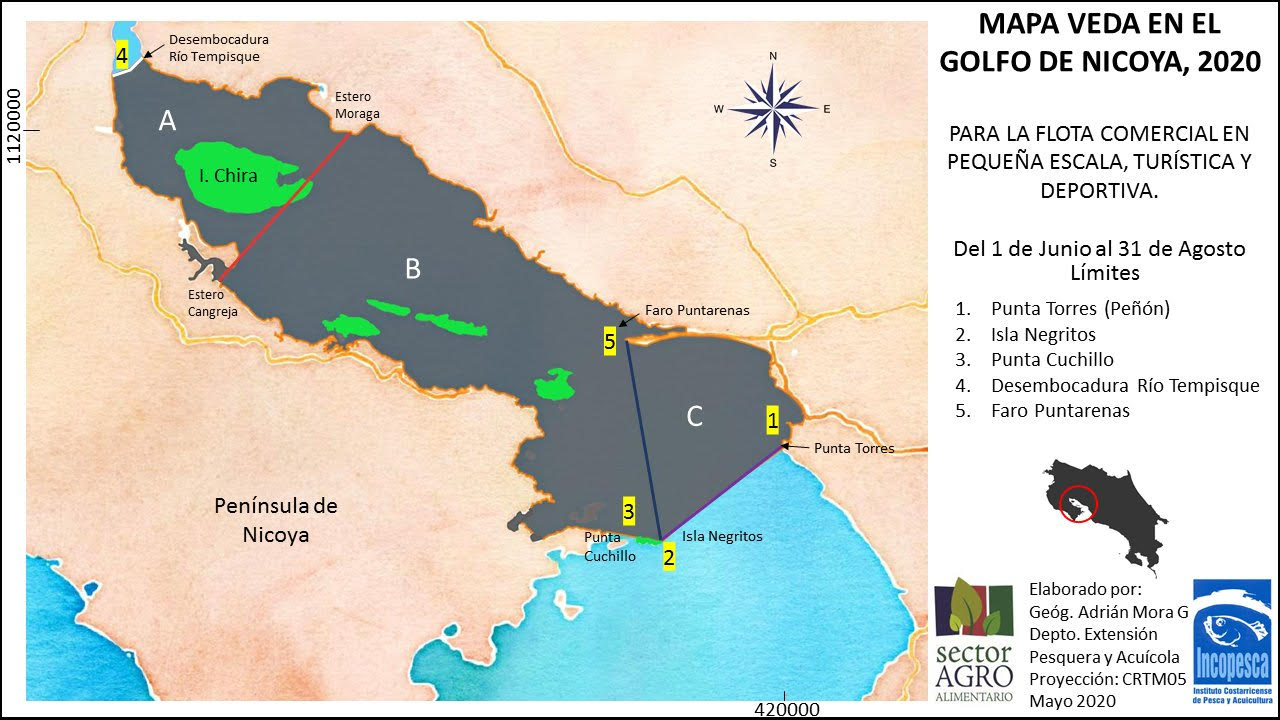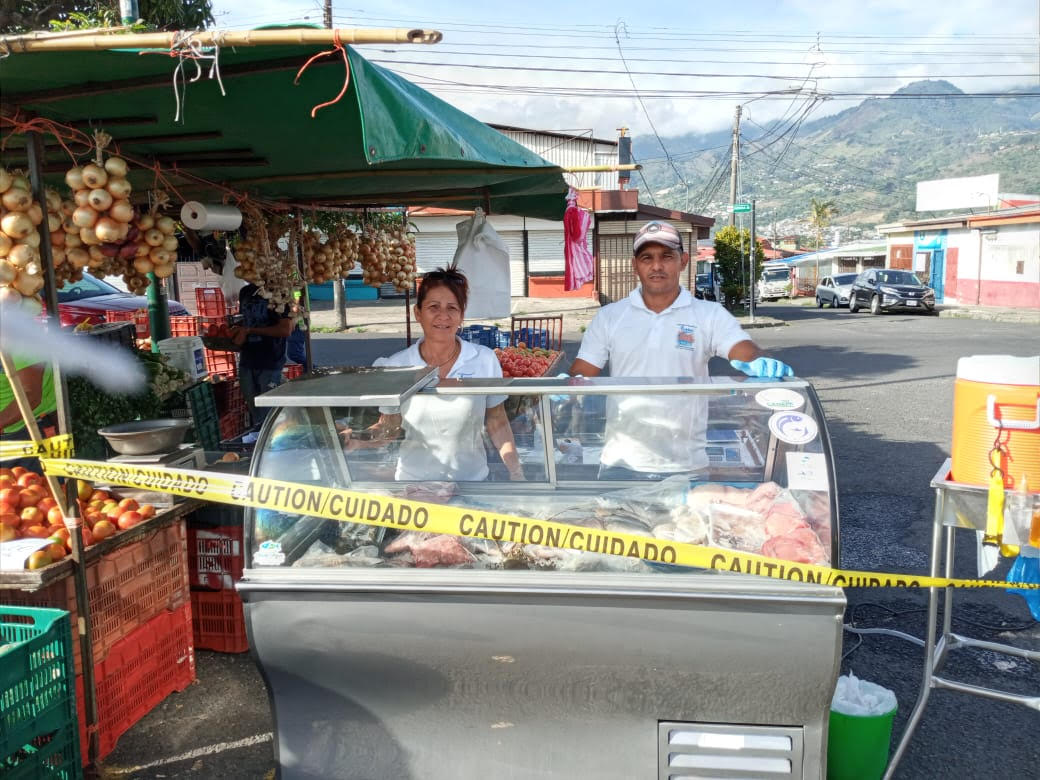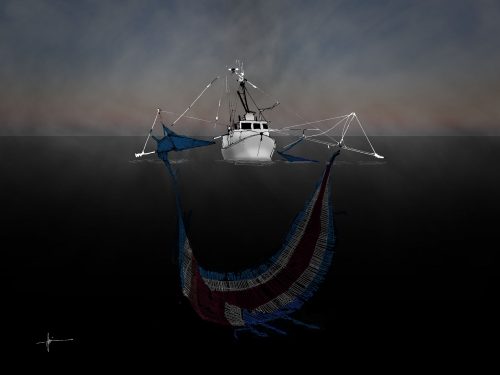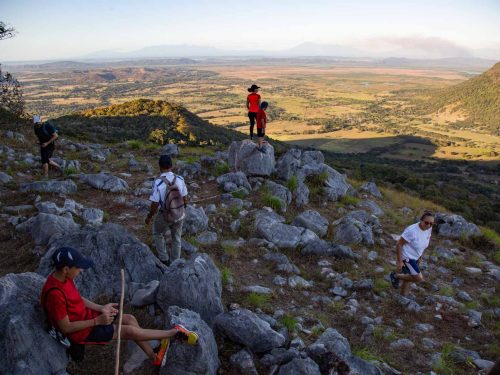
The Costa Rica Institue of Fishery and Aquaculture (Incopesca) estimates that 1,300 families of fishermen in Guanacaste stopped receiving a fixed income as a result of the COVID-19 pandemic in the province.
The closure of restaurants, hotels and fish shops made it impossible for these fishermen to continue selling their products as they normally did, according to the institution.
Employment survey data from the National Institute of Statistics and Census (INEC) show that by the last quarter of 2019, the second largest source of employment in the province was hotels and restaurants, a sector that created more than 23,000 jobs.
However, due to the current COVID-19 crisis in Costa Rica, 140 hotels in Guanacaste were forced to close their operations, leaving economic losses of $300 million and affecting nearly 2,000 employees, according to the Guanacaste Chamber of Tourism (Caturgua).
As a response, the Guanacaste Chamber of Fishermen (CPG) launched the Arroz y Frijoles (Spanish for ‘Rice and Beans’) initiative, where the institution buys seafood from fishermen and then sells it at the farmers’ markets.
It is the first time that fish products are sold in these places. According to the press officer of Incopesca, Víctor Fernández, in the past they were not taken to the farmers’ markets because the fishermen could manage the sale of their own products.
This initiative is named after the chance to keep bringing the basic food –arroz y frijoles– to the tables of these fishermen.
“Fortunately, sales have been constant, we’re getting out a few fishes, around 30 to 100 kilos per night. We have been able to sell and also for consumption, thanks to them [CPG] we have been able to keep the rice and beans,” said Alan Espinoza, a fisherman from Playas del Coco.
Incopesca already had plans to introduce coastal fishermen to the farmers’ markets since September 2019, when they developed a strategy together with the National Production Council (CNP) to achieve this. However, the pandemic forced them to speed up the process to meet the needs of the fishermen.
The CNP already had access to some of the stands at the fairs, but these were for agricultural products; what they did was reaching an agreement with the Board (National Farmers’ Markets Board) to pass it on to fish products,” said the head of the marketing department of Incopesca, Ana Azofeifa.
According to Azofeifa, Incopesca’s projections extend beyond the pandemic, as they work to get other associations and fishermen into the farmers’ markets.
Therefore, the CPG, in coordination with Incopesca, the CNP and the National Farmers’ Markets Board, finalized an agreement to include fishermen in the farmers’ markets.
As a result of this response, the products of these fishermen arrive for the first time at the farmers’ markets in Liberia, Santa Ana, Zapote, Nicoya and Santa Cruz.
“We also want to establish alliances or partnerships with more places so that we can expand the points of sale. The prices are fair and in addition to enjoying high quality products, they will be supporting hundreds of Guanacastean families,” said Martin Contreras, president of the CPG.
Incopesca contributes to the search for new points where they can market the products of the fishermen, such as the Regional Chorotega Market.
Blessed Be the Snapper Fish
The snapper is the best-selling fish by the fishermen of Guanacaste. The CPG buys it at ₡2.000 per kilo. This is, however, a lower price than that offered by traders before the pandemic, which ranged from ₡2,500 to ₡3,500 per kilo.
Alan Garcia, a fisherman from Guanacaste, believes that it is more convenient to sell the fish to the CPG than to traders at this time because he sees that their prices do not suffer transitions depending on the competitor; instead, since it is a fixed price, it generates more confidence and stability for workers like him.
The funds acquired by the CPG from the sale of these fish enter a buying and selling circle, where they are used to buy back more fish from the fishermen in Guanacaste.
As of the last week of June, Incopesca knows that CPG managed to buy 21,600 kilos of fish from workers in Guanacaste, but the chamber has not provided further information about the total sum of the purchase in colones.
Like fish in water
This entire trading process begins at a fish collection center set up by the CPG in Playas del Coco, which receives the product from the fishermen of Cuajiniquil, El Jobo, Coyote, and Bejuco, as well as from Isla Venado, Playas del Coco, Puerto Níspero, and Costa de Pájaros.
In order to do this, the CPG provided ₡10 million to cover the cost of transport trucks, administrative staff and to pay for the salaries of seven new employees, who work on cleaning, selling and buying the fish.
The funds are not from what is being generated by sales, they come from our own capital,” said CPG President Martin Contreras.
Maria Elena Avila, the president of the Puerto Nispero Fishermen Association, explained that the CPG sends its trucks to pick up the fish in the communities, and emphasizes that it is not necessary for the fishermen to go to the facilities, although she recognizes that some workers prefer to bring their own merchandise.
In addition to storing, the CPG reached an agreement with the Asociación Costa Rica Por Siempre (ACRXS), which allowed them to fund fuel, fish bait and ice for 30 vessels.
Along with this agreement, Incopesca and ACRXS offer the Chamber a fishing monitoring system, which is in charge of measuring, weighing and recognizing the species of the fish unloaded in the collection.
“(With this initiative) we are making progress in providing an opportunity for the Chamber of Fishermen to start its own biological fisheries monitoring system, which will serve as a basis for future decision-making by INCOPESCA, strengthening science and technology as the pillars of management of the Institute,” said Daniel Carrasco, Executive President of Incopesca.
One for another
At the moment, the solution of the Chamber is not for everyone: the organization only buys from fishermen who have the artisanal fishing license.
According to Incopesca, 361 fishermen are registered and licensed for both artisanal and self sufficient fishing in Guanacaste. Those with a tourist or sport fishing license are prohibited from entering the sea during the pandemic.
The situation in the Coco is difficult because the fishing is not so good; and not everyone can fish. Many of us depend on tourism, fishing itself depends on tourism, but this situation has made it difficult,” exclaimed the President of the Asociación de Pescadores de Playas del Coco, Dehivis Jiménez Chaverri.
Sustainable licensed fishermen may fish on the beaches for their own consumption, however, they may not sell their fish product to the CPG.
Meanwhile, with the solution offered by the CPG, another concern arises for the fishermen of the Gulf of Nicoya: the closed season that began last June 1th and will last until August 31th.

The IMAS subsidy arrives as a relief for the fishermen and workers of the province of Guanacaste, in view of the closure in times of crisis. By Incopesca
The seasonal closure is a period in which fishing is restricted, a method that in Costa Rica has been applied since 1985 with the aim of protecting the marine resource and giving time to the cycle of reproduction and subsistence of the animals.
“It stretches from Punta Torres, known as Peñón, to the Isla Negritos lighthouse on the outside; and from there, to the eastern part of Punta Cuchillos on the Nicoya Península, and from that line inland to the mouth of the Tempisque River,” Carrasco explained.
This temporary restriction affects about 1,500 people, including licensed artisanal fishermen and small-scale fishing assistants in the communities of the Golfo de Nicoya.
However, given this problem, last Friday, May 29th, the Instituto Mixto de Ayuda Social (IMAS) announced the implementation of an economic, complementary and temporary subsidy of ₡145.000 per month during its three month restriction.
However, the subsidy is only being provided to fishermen and its helpers in the Golfo de Nicoya.
In the announcement, IMAS indicated that 1,473 people, including artisanal fishermen (registered within Incopesca) and assistants, will receive the subsidy.
Looking ahead, CPG President Martin Contreras confirmed that they plan to continue helping fishermen with the Arroz y Frijoles initiative, and to continue discussing solutions that can be applied to tourist fishing, although he did not provide any details on this.







Comments